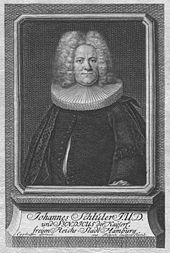Johann Slueter
Johann Slueter , also Schlueter (born March 24, 1616 in Winsen (Aller) , † October 21, 1686 in Hamburg ), was a 17th century German lawyer and syndic , later councilor and finally mayor of the Hanseatic city of Hamburg .
Life
Slüter was a member of originating from Westphalia Hamburger Council Family Slüter and son of the senior pastor at St. Jacobi Severin Schlüter . He attended the learned school of the Johanneum in Hamburg and then studied at the universities in Rostock, Marburg, Greifswald and Helmstedt, first theology and later, after rethinking, law. 1642 he was at the University of Strasbourg Dr. jur. PhD.
After returning to Hamburg, Slüter practiced as a lawyer in his hometown. In 1652 he published a counterpart to the anti-imperial and pro-Swedish treatise Dissertatio de ratione status in imperio nostro Romano-Germanico, published under the pseudonym Hippolithus a Lapide ( Bogislaw Philipp von Chemnitz ) . Nevertheless he was active in the Swedish judicial service in Wismar from 1654 . At that time, Wismar, along with Swedish-Pomerania and Bremen-Verden, belonged to the Swedish imperial territories. The government in Stade nominated him in 1655 for an assessor position at the Upper Tribunal Wismar , which had existed since 1653, and which he took up in 1656. The Vice President David Mevius who worked there was married to a niece of Slüters. In 1669 Slüter became Chancellor of Duke Gustav Adolf zu Mecklenburg and at the same time President of the Court in Güstrow .
In 1678 he preferred to return to Wismar to be the first councilor of the council in Hamburg, after his status was privileged compared to the older syndici already active there. In Hamburg he successfully represented the interests of the Free Imperial City towards the outside world as well as towards neighboring Denmark. Around 1684 there were inner-city disputes between the Senate and the citizenship in Hamburg. The citizenship was represented by the thirties committee under its spokesmen Hieronymus Snitger and Cord Jastram . The conflict meant that the mayor Hinrich Meurer not only lost his office in 1684, but also had to leave the city. Slueter was appointed as his successor.
In the course of the Danish siege of Hamburg (1686) , the Thirties Committee and its political leaders came under pressure as collaborators with the Danes. The allegations were also extended to Slueter, who, however, kept his distance from his thirties and had always kept it. Slueter denied the allegations made against him, but was arrested and imprisoned in the Eimbeck house , where he suddenly and unexpectedly died while in custody. Mayor Hinrich Meurer was reinstated in his old office as mayor in November 1686.
His son Severin Walther Slueter (1646–1697) became general superintendent of the Duchy of Lauenburg. His son Matthäus Schlüter (1648–1719) became a lawyer and in 1703 was elected to the Hamburg council.
literature
- Otto Beneke: Johann Schlueter . In: Allgemeine Deutsche Biographie (ADB). Volume 31, Duncker & Humblot, Leipzig 1890, p. 613 f.
- Lukas von Bostel : Truthful Deduction-Schrifft, Wherein The Origin and Course of the, by both Executirten Cordt Jastram and Hieronymus Schnitker, As well as their adherents, entangled hopeless Complots ... is presented and proven , Hamburg 1687.
- Johann August Ritter von Eisenhart : Slueter . In: Allgemeine Deutsche Biographie (ADB). Volume 34, Duncker & Humblot, Leipzig 1892, p. 473 f.
- Hans Schröder, Carl R. Wilhelm Klose (Hrsg.): Lexicon of Hamburg writers up to the present. Volume 6: Pauli-Schoff. Hamburg: W. Maukes Sons 1873, pp. 574-579 (with list of publications), see also the family tree ibid. P. 573 ( digitized version )
- Grete Grewolls: Who was who in Mecklenburg and Western Pomerania. The dictionary of persons . Hinstorff Verlag, Rostock 2011, ISBN 978-3-356-01301-6 , p. 9477 .
Web links
- Literature by and about Johann Slüter in the catalog of the German National Library
- Literature about Johann Slueter in the state bibliography MV
- Publications by and about Johann Slüter in VD 17 .
Individual evidence
- ↑ According to the state bibliography of Mecklenburg-Western Pomerania . ADB names 1616 and 1618 side by side as years of birth. From the context of his father's biography, 1616 is assumed here, as he is said to have been born a year before his father was called to Hamburg (1617).
- ↑ See the entry of Johann Slüter's matriculation in the Rostock matriculation portal
- ↑ In Part. I. Cap. 1 - 8 publicatae a quodam, qui Hippolithus a Lapide vocari voluit, dissertationis de ratione status in imperio nostro Romano-Germanico animadversio: qua subrutis falsis totius fere dissertationis fundamentis, genuina substituntur, & verus imperii status generaliter exprimitur. Glückstadt: Koch 1652 ( digitized version )
- ^ Nils Jörn : Family relations at the Wismar Tribunal - problems and opportunities. In: Ivo Asmus, Heiko Droste, Jens E. Olesen (eds.): Common acquaintances: Sweden and Germany in the early modern period. LIT Verlag, Berlin-Hamburg-Münster 2003, p. 236f ( Google books ).
- ↑ Nils Jörn: The judicial staff at the tribunal. In: Nils Jörn, Bernhard Diestelkamp, Kjell Å Modéer (eds.): Integration through law. The Wismar Tribunal (1653–1806). Böhlau, Cologne 2003, ISBN 3-412-18203-6 , p. 270 ( Google books ).
| personal data | |
|---|---|
| SURNAME | Slueter, Johann |
| ALTERNATIVE NAMES | Schlueter, Johann |
| BRIEF DESCRIPTION | German lawyer, syndic, councilor and mayor of the Hanseatic City of Hamburg |
| DATE OF BIRTH | March 24, 1616 |
| PLACE OF BIRTH | Winsen (Aller) |
| DATE OF DEATH | October 21, 1686 |
| Place of death | Hamburg |
